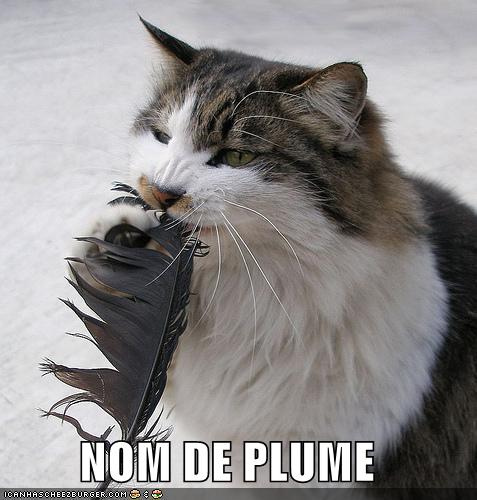This Lego guitar is really cool, and I don't even care if it plays well. Best of all, if you want to do a rock-star guitar smash, you can just put it back together again.
Blarg!
Bill's blog. Writing, guitars, gratuitous Simpsons references, you'll find it all here. Almost certainly a waste of time for both you and the author. On the internet, that's actually a plus.
How to create your perfect pen name: My new Writer Unboxed column
photo by Amy Strachan
I've got a new coumn up at Writer Unboxed dedicated to helping you come up with the ideal pen name to launch your writing career. Behold, an excerpt:
Quick, what’s the first name of your protagonist’s favorite singer? What’s the first initial of your least-favorite Teenage Mutant Ninja Turtle? Now tell me your favorite brand of liquor. For me, Robert Plant plus Raphael plus Kraken rum gives me Robert R. Kraken — I’ve already harangued my parents for not giving me this name. You’re on the right track if you end up with something like John D. Morgan or Nico R. Dubonnet. If you come up with Ke$ha L. Ron Rico, please stop writing, because you have terrible taste in everything.
You can read the whole thing here. And check out some of my other columns while you're there.
How to Create Your Perfect Pen Name at Writer Unboxed
How to be an author 24-7: My new column at Writer Unboxed
Want to be a pro writer? My new column at Writer Unboxed shows you how to turn a fun hobby into a pro-level cycle of toil & anguish. Here's a quick excerpt:
You’re home from work (you listened to an audiobook during your commute, didn’t you? DIDN’T YOU?!). Dinner with the fam is the ideal time to focus-group plot points and character sketches. Also make sure to ask your family how their day was. These conversations pay big dividends in writing material, like the literary equivalent of hilltop-removal mining. Your spouse and children will come to know the phrase, “That’s so great, I’m totally putting it into my book!” as the response that is most akin to the emotion they call “love.”
How to be an author 24-7 at Writer Unboxed
It's hard being so amazing - or - When did superheroes get so whiny?
I saw Man of Steel a few weeks ago, and despite enjoying it, I like it less and less the more I think about it. Don't get me wrong, it had many cool touches. Good fight scenes. The Kryptonian tech seemed genuinely alien. The iconic "S" emblem was a symbol of hope instead of a galactic coincidence of two distant planets having the same alphabet. I even liked the stuff Superman purists hated [spoilery, so highlight to read]. I had no problem with Superman killing Zod. Yeah, I know, Superman doesn't kill. But what was he supposed to do? Take him to the county jail? Superman's options were to either kill him or hope he could keep a super-powered, genocidal maniac in a headlock for the next thirty years.
So why can't I think about Man of Steel without gnashing my teeth? Didn't it give people the always-appealing tale of an outcast overcoming doubters to do something remarkable and gain acceptance?
It did, and that's the problem.
Superman is not a plucky overachiever. He's not an underdog in any sense of the word. That's the whole hook to being Superman. But Zach Snyder would have us believe there's no greater burden than secretly being a living god walking amongst mortals. Like Dances With Wolves tells young Clark, "Son, if the world finds out you're the most gifted person to walk the earth since Jesus Christ, they'll reject you. Not in any way that could actually hurt you, of course. I'm talking about feels here." Or something--I dunno, I don't have a copy of the script handy.
For many superheroes, their biggest problem is they're JUST SO AMAZING that nobody likes them. Take the public's fear of mutants out of X-Men and Xavier's School for Gifted Youngsters may as well be Degrassi. J. Jonah Jameson uses a major metropolitan newspaper to conduct his personal flame-war against Spider-Man. Harry Potter's aunt and uncle are so afraid of his superior abilities, they store him under the stairs like a damn kitchen mop. (And yes, Harry Potter is a superhero. He flies around wearing a cape, using magical powers to save the world from evil. How is he not a superhero?)
You thought Lex Luthor and Galactus were tough? Today's superheroes have to deal with haters, and you sure attract a lot of them when you're single-handedly striking down the forces of chaos. Maybe that's why Superman's so courageous in the face of evil--because when you've spent your whole life coping with DIRTY LOOKS from people who pose no threat to you, fighting an extraterrestrial psychopath bent on exterminating the human race feels like the slow-pitch machine at the batting cage, amirite?
Why do we accept this nonsense? I think it's because it reinforces what we'd all like to believe about ourselves: People don't understand me because I'm too awesome. Have no friends and can't get a date? It's 'cause people can't handle how real I am! Nobody wants to publish my novel? Well, I guess my work is too edgy for the establishment! Superheroes are the ultimate in wish-fulfillment--not only can they do amazing things to spite our enemies, but they also absolve us from having to confront our own shortcomings. It sure beats having to learn social skills or dedicate years to practicing one's craft.
All this superhero angst is like the Powerball winner who complains about how much the IRS takes out of his winnings. As if he wasn't still filthy-freaking rich after taxes. As if he'd earned that money. In fact, the
modern superhero story is pretty much about winning the lottery--some dude in a lab coat is
messing with a science thingy-doo just as a squirrel accidentally
triggers the transmorpho ray. Then BLAMMO! Suddenly Mr. Lab Coat can spring from tree to tree and cram sixty-five walnuts into his mouth. Like the lottery winner, he didn't achieve this via effort or skill, it was all dumb luck. And now that he can do these wonderful things, he's sad because he's ostracized by the very people he's trying to protect. O Fortuna!
"Oh yeah?!" argues a straw man that wandered by. "If people don't tear down exceptional people, then how come I got picked on in school for being on the Mathletes? Being subject to ridicule shows that even though superheroes have fantastic powers, they're really just like us." Sadly, playground culture (and a depressing amount of adult culture) doesn't value academic achievement as much as it should. But if there's one thing our culture does value, it's athletic prowess. Faster than a speeding bullet? Able to leap tall buildings in a single bound? These are feats of athleticism, and a big reason why the superheroes-as-mistreated-nerds trope is ridiculous. If Superman really existed, he'd have much more in common with LeBron James than any of us, and all he can do is dunk a basketball.
"But I hate LeBron!" the straw man says (quite correctly). Yeah, a lot of people do. The thing is, he's so talented that he's still one of the most popular athletes in the world. How much patience would you have if that guy complained that people don't like him? You'd hate him even more for it. But Lazer Woman feels blue about the mean folks who are jealous of her powers? Well, Ms. Lazer, grab a chair and tell me about your troubles while I heat up some cocoa.
Being a superhero isn't all flowers and sunshine, of course. It's also not mandatory. If super powers are that much of a burden, then go get a real job. Want to save the world? Join the Army or the Peace Corps. At the end of they day, superheroes can still do things mere mortals can only dream of doing. If they don't like it, they're not getting any sympathy from me.
The Other Van Zant - An overview and excerpt of my mystery novel
I've added a brief overview of and excerpt from my mystery novel, The Other Van Zant, to the website. Go check it out and give me lots of money.
"Suicide Chef" and "P is for PWNED" to appear on Tales to Terrify
Tales to Terrify will publish audio versions of two of my short stories, "Suicide Chef" and "P is for PWNED." If you're not already a listener, Tales to Terrify is a sister podcast of the Hugo-award winning Starship Sofa.
"Suicide Chef" was originally published in issue 7 of Opium Magazine. A chef finds a way to save his struggling restaurant, but with deadly consequences. It was my first-ever fiction publication, so I'm really excited to reintroduce people to it. It'll be my first audio narration, too, so I hope you enjoy it.
"P is for PWNED" is a new one--it's a detective story about Charles Moncrief, a geriatric, hard-boiled private eye who's hired to crack the case of a kid who killed himself over losing a video game. To solve it, he'll have to overcome his estranged daughter, the ravages of old age, and his complete ignorance of computer technology.
They'll be on different episodes, and I'll let you know the release dates as soon as I have them.
My new project
My new non-writing creative project.





I don't do anything fast except type, so it'll probably be a while before I'm done. It's a lot of fun to work on, though. I'll be sure to show the finished project when it's done. It might even be playable! (fingers crossed)
"How to PWN Twitter" at Writer Unboxed
My latest column is up at Writer Unboxed. I share the secrets of how to become the best Twitterer on Twitter that has ever Twittered.
Twitter allows us to establish relationships with thousands of potential readers every day. There’s a 1:1 ratio of Twitter followers to book buyers, according to a study that probably exists somewhere. You can get followers simply by following lots of people. Unless they’re inhuman monsters, they’ll feel pressured to follow you back. Yeah, this will clog your feed with flame wars and Pinstagrams or whatever, but you’re going to unfollow everybody once you get to 15,000 anyway.
This is probably as good a time as any to ask you to follow me on Twitter, if you're not already.
Hacks for Hacks: How to PWN Twitter
Locus reviews "Athlete's Foot"
Lois Tilton of Locus reviewed Crowded #1, which included my short story, "Athlete's Foot." Her opinion was a resounding "meh."
This is humor, that sort that depends on making the fall guy into such an egregious asshole so we can laugh at a misfortune that would be tragic in a sympathetic character. It also helps if the misfortune is a bit absurd. The narrator, give him credit, does come up with some sympathy in the end.
Fair enough. One of the most important lessons I learned as a creative person is that you can't fault people for not liking what they don't like. The fact that Ms. Tilton thought my short story "Lucky" was "genuinely funny" eases the sting a little, too.
Lois Tilton reviews Short Fiction, early March
Related
Novel draft finished!
On Tuesday, I finished the first draft of my novel-in-progress, tentatively called National Champions. A couple of weeks ago as I was slogging toward the end of the book, I noticed that I'd started it on April 2, 2012. Stephen King advises never to take more than three months to bang out a draft. I don't know if I'll ever be that fast, but I decided a year was quite long enough, thank you. So on April 2, 2013, I triumphantly typed "THE END" at the end of the manuscript.
This is the point in the process when a lot of writers like to bemoan how bad their first draft is. I don't understand this--a builder doesn't frame out a house, then say, "Man, this place is a dump!" It's supposed to be rough when it's a first draft. Personally, enjoy the editing process way more than the drafting process anyway. I'm giving myself a break from this book -- at least a month, no more than three -- to work on some short stories and my next column. Then I shall look upon this world I have wrought, then -- and only then -- will I realize how terrible my first draft probably is. And that's okay.
If you're curious about the book itself, it's a superhero novel about a kid named Cody Hawthorn. He's your everyday clueless teenager, except that he can bench press 2,000 pounds and finds bullets a minor annoyance. He gets a recruited to attend Piedmont State University to pursue a degree in Civil Defense -- my fancy in-world title for a superhero-studies program.
Piedmont State isn't Hogwart's, nor is it Xavier's School for Gifted Youngsters. This is a public research institution where faculty expertise doesn't necessarily translate to good teaching; where other programs of study compete with (and feel resentment toward) the Civil Defense program's notoriety and funding; and no matter how talented you are, professors will always like next year's recruiting class better than you.
The second draft shouldn't take nearly as long as the first. I'm looking forward to taking a break, though, before tearing into the story again. I'll keep you posted when it's finished.








